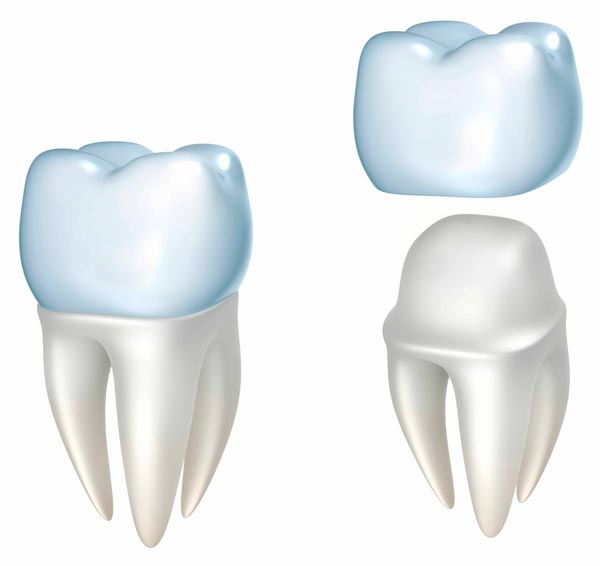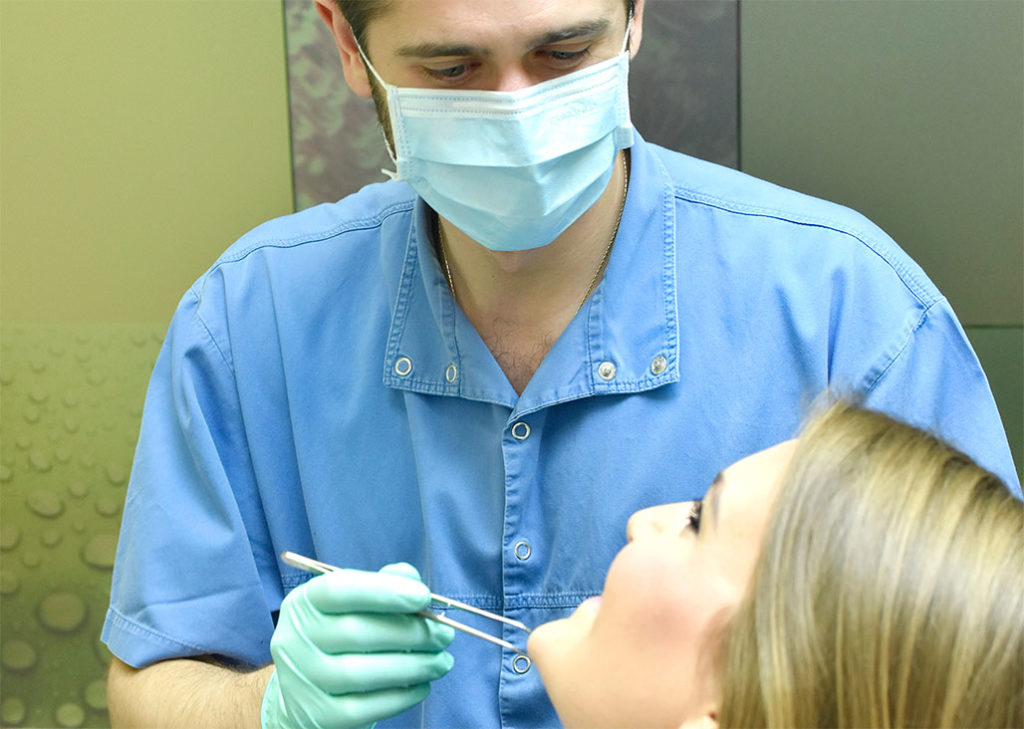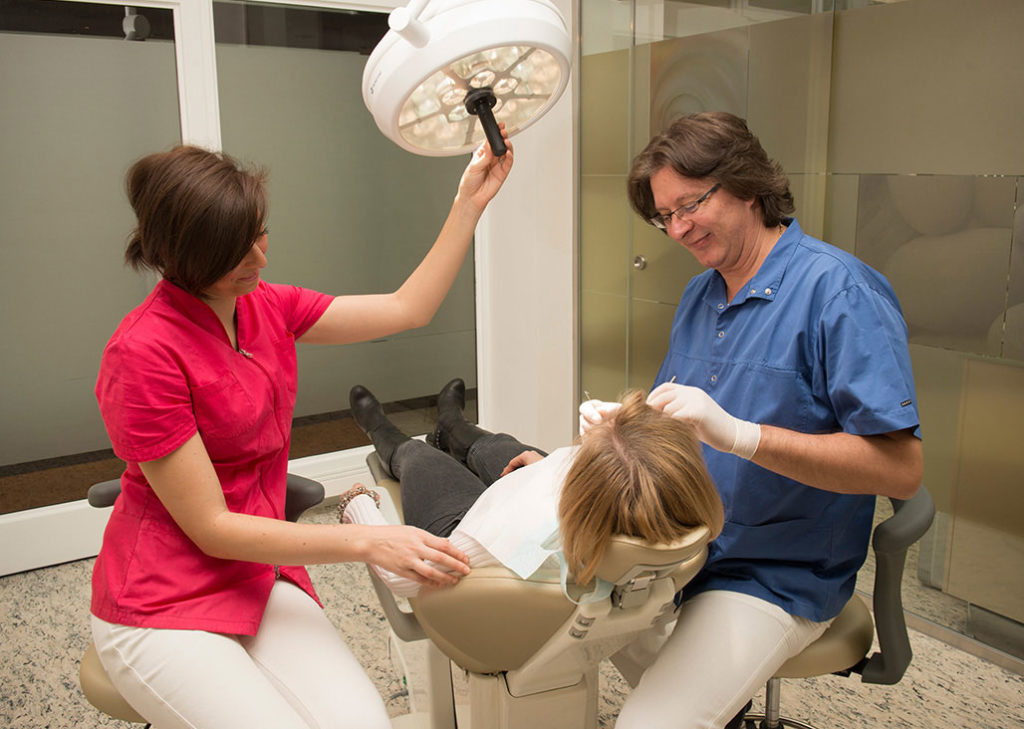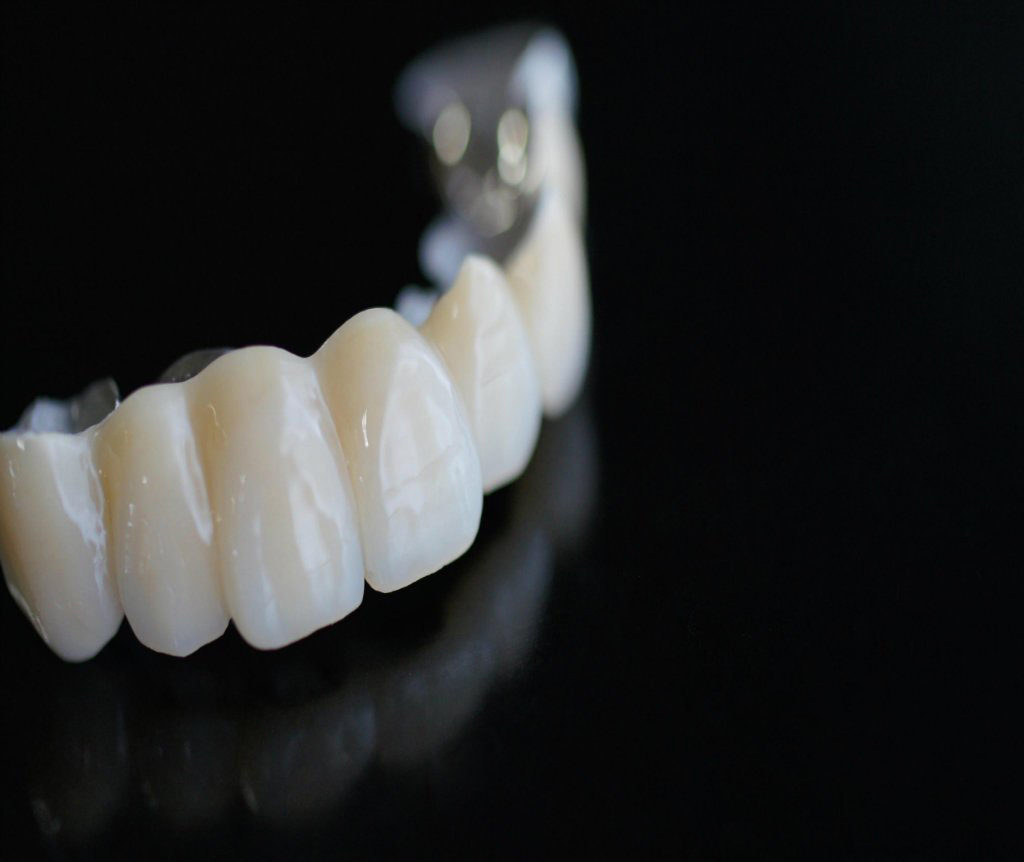
Tooth restoration with dental crowns
The importance of prosthetic dentistry is increasing due to the rapid development in the field of materials sciences, which has introduced new restorative materials for reconstructive medicine. In our Dentistry and Oral Surgery Clinic in London, we offer permanent solutions for all kind of dental problems. We begin prosthetic treatments with a thorough examination and dental hygiene care, in order to perform our dental and oral surgery services most efficiently.

What is a dental crown?

A dental crown is a fixed prosthesis. It is practically a cap that surrounds the tooth, and after proper fitting it can provide a long-term solution to restoring the function of your teeth.
Dental crowns are indirect restorations as they are fabricated in dental laboratories, not in the oral cavity directly. In preparation for the crown, the decay is removed and the tooth is reshaped for a crown to fit. Once the tooth is ready to support the crown, a copy of the prepared tooth is taken by an impression of the tooth and the impression is used by the dental lab to fabricate the crown.
When is a dental crown needed?
- In case of excessive wear of teeth
- Teeth that have an unacceptable appearance due to color (for aesthetic purpose)
- To save a tooth that has been so damaged by decay/accident that it cannot support a filling
- To hold a dental bridge in place
- A tooth that has had a root canal almost always needs to be restored with a crown immediately to prevent it from fracturing.
Dental crown is not recommended: if the tooth is excessively mobile, infected, its root canal treatment has failed, or too much portion is missing.
Book an appointment for a consultation to know whether dental crown is a suitable option for you.

Steps of dental crown procedure
1. Comprehensive dental consultation and oral assessment
The first step is a consultation, during which the dentist will conduct a comprehensive dental examination, and based on and X-ray/CT scan prepare a treatment plan for you.
2. Teeth preparation for dental crown
If a tooth is replaced by a dental crown, the original tooth has to be prepared for the placement of the dental crown. First, the dentist cleans the teeth, then grounds them down on all sides under local anaesthetic to have a specific shape where the crown can be later fitted.
Once the dentist has completed shaping the teeth, he will need to make a copy of it by way of taking a dental impression which will be sent to the dental laboratory. Until the technicians prepare the crown, you will receive a temporary crown to keep the tooth aesthetic.
3. Tooth fabrication in the dental laboratory
Dental technicians fabricate the dental crown within a few days, using the most technologically advanced equipments and materials available.
4. Adjustments before the permanent fitting of the crown
After the lab has crafted the crowns, the patient would return for a try-in session. The dentist will check the color and fit of the crown, make sure that it lines up correctly with the bite, comfortable, gives the desired smile and then if all is in order, permanently cement the crown into place. Our goal is to use the dental crown which is most suitable for the patient’s needs and requirements.
Prior to the final cementation, the tooth is treated with a special material which ensures a painless treatment without irritating the gums and facilitates the adhesion between the tooth and the crown.
5. The perfect dental crown
After all have been prepared and the crown fits properly, our dentist places the dental crown in its place permanently. This is a simple procedure, which our highly-qualified and experienced dentists carry out with the best results day by day. Following the permanent fitting of the crown, the patient can enjoy his perfect new smile.
How long does the crown preparation procedure take?
It usually takes about 1-2 weeks from the first consultation with our qualified dentist until the permanent fitting of the crown.
What is the material of dental crowns?
Due to recent prosthetic solutions, there are different dental crowns available. At the Implantcenter Dentistry and Oral Surgery Clinic our dentists work with two types of crowns: porcelain-fused-to metal and zirconia crowns.
Porcelain crowns (porcelain-fused-to-metal crown)
The porcelain crown’s basis is a metal frame on which porcelain is fused to cover the tooth to restore its shape, size, strength, and improve its appearance. These types of crowns are mostly used in the anterior regions due to their strength and durability.
The porcelain crowns’ advantages:
- long-lasting, durable
- prepared within a short deadline
- affordable at a favorable price
It can cause irritation if the porcelain crown separates from the gum and you turn out to be allergic to the metal. Fortunately, such incidents occur at a low rate.
If you have any questions or concerns, do not hesitate to contact us.


Zirconia crowns
Zirconium is becoming one of the most chosen materials for dental crowns. Its base material is zirconia-dioxid, an entirely metal-free material. Zirconia has become a substitute for metal frames as porcelain restorations cannot match zirconia in terms of strength, durability, longevity, appearance, and patient comfort. Aesthetically, zirconia dental restorations look extremely natural. The optimized microstructure of the zirconia produces greater translucency, so the restorations reflect light in the same manner as natural teeth. This gives zirconia restorations an incredibly lifelike appearance. Further, the restorations can be color matched to your existing teeth. Due to the zirconium-dioxide material and special manufacturing procedures, zirconia restorations have ten times higher duration than porcelain products.
Due to the excellent qualities of the zirconia frame, zircon crowns perfectly fits on the tooth neck and the surface of the gum, therefore they don’t get visible in case of gum recession. Zirconia crows do not require special care, you just have to apply the same hygienic routine that you would do in case of your natural teeth.
Advantages of zirconia crowns:
- biocompatible
- translucent enough to be similar to natural teeth
- outstanding aesthetic results
- durability
- metal-free, aesthetic solution
- they don’t separate from the gum

E.max dental crown
The newest and strongest type of dental crowns is e.max, which is also available in our dental clinic. It is the most natural-looking crown on the dental market currently. It is made from ceramic (porcelain) material, so it is metal-free and hypoallergenic. With no metal substructure or core material, the light refraction and reflection of the material is more closely mimic that of natural tooth structure.
Would you like to know more about dental crowns and get a perfect smile? Contact us:
